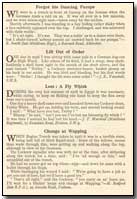Memoirs & Diaries - The Best 500 Cockney War Stories - Lift Out Of Order and Other Stories
 Published in London
in 1921, The Best 500 Cockney War Stories
comprised, in the words of its newspaper publisher (The London Evening
News) "a remembering and retelling of those war days when laughter
sometimes saved men's reason".
Published in London
in 1921, The Best 500 Cockney War Stories
comprised, in the words of its newspaper publisher (The London Evening
News) "a remembering and retelling of those war days when laughter
sometimes saved men's reason".
The collection of short memoirs, some 500 in total, is divided into five categories - Action, Lull, Hospital, High Seas and Here and There. This page contains five stories from Action, led by Lift Out Of Order.
Other sections within the collection can be accessed using the sidebar to the right.
Lift Out Of Order
One day in 1916 I was sitting with some pals in a German dug-out in High Wood. Like others of its kind, it had a steep, deep shaft.
Suddenly a shell burst right in the mouth of the shaft above, and the next instant "Nobby," a Cockney stretcher-bearer, landed plump on his back in our midst. He was livid and bleeding, but his first words were: "Strike! I thought the lift were outer order!"
J.E., Vauxhall, S.W.8
Lost: A Fly Whisk
During the very hot summer of 1916 in Egypt it was necessary, while eating, to keep on flicking one hand to keep the flies away from one's mouth.
One day a heavy shell came over and knocked down my Cockney chum, Tubby White. He got up, holding his wrist, and started looking round. I said: "What have you lost, Tubby?"
"Blimey," he said, "can't you see I've lost me blooming fly whisk?" It was then I noticed he had lost his hand.
J.T. Marshall (Middlesex Regiment), 17 Evandale Road, Brixton, S.W.9
Change at Wapping
When Regina Trench was taken in 1916 it was in a terrible state, being half full of thick liquid mud. Some of the fellows, sooner than wade through this, were getting up and walking along the top, although in view of the Germans.
The Cockney signaller who was with me at the time, after slithering along the trench for a time, said: "I've 'ad enough er this," and scrambled out of the trench.
He had no sooner got on top when - zipp - and down he came with a bullet through his thigh.
While bandaging his wound I said: "We're going to have a job to get you out of here, but we'll have a good try."
"That's all right," said the Cockney, "you carry on an' leave me. I'll wait for a blinkin' barge and change at Wapping."
H. Redford (late R.F.A.), 49 Anselm Road, Fulham
"The Canary's Flown Away!"
I was in charge of a party carrying material from the dump to the Engineers in the front line. One of the party, a man from Camberwell, was allotted a bulky roll of barbed wire.
After a desperate struggle through the muddy and narrow support trenches, we reached the front line. There was still another 400 yards to go, and our Cockney decided to continue the journey along the parapet.
He had not gone far before the German machine guns began to spit and he fell in a heap into the bottom of the trench with the coil of barbed wire on top of him.
Thinking he was wounded, I went back to him and inquired if he was hit.
"'It? 'It be blowed," he said, "but if somebody was to take this blinkin' birdcage orf me chest I might be able to get up."
The journey was completed through the trench, our friend being a sorry sight of mud and cut fingers and face.
On arriving at our destination he dropped the wire at the feet of the waiting corporal with the remark, "'Ere you are, mate; sorry the canary's flowed away."
A.S.G. (471h Division), Kent
"Go it, Applegarf! I'll Time Yer!"
Our battalion was making a counter-attack at Albert on March 29, 1918, against a veritable hail of lead. Wounded in the thigh, I tumbled into a huge shell hole, already occupied by two officers of the Fusiliers (Fusiliers had been on our left), a lance-corporal of my own battalion, and three other men (badly wounded).
Whilst I was being dressed by the lance-corporal another man jumped in. He had a bullet in the chest. It didn't need an M.O. to see that he was "all in," and he knew it.
He proved to be the most heroic Cockney I have ever seen. He had only minutes to live, and he told us not to waste valuable bandages on him.
Thereupon one of the officers advised me to try to crawl back before my leg got stiff, as I would stand a poor chance of a stretcher later with so many badly-wounded men about. If I got back safe I was to direct stretcher-bearers to the shell hole.
I told the officer that our battalion stretcher-bearers were behind the ridge only about 100 yards in the rear, and as my wound had not troubled me yet I would make a sprint for it, as the firing was still too heavy to be healthy.
On hearing my remarks this heroic Cockney, who must also have been a thorough sportsman, grinned up at me and, with death written on his face, panted: "Go it, Applegarf, an' I'll time yer."
[Applegarth was the professional sprint champion of the world.] The Cockney was dead when I left the shell hole.
F.W. Brown (late 7th Suffolks), 247 Balls Pond Road, Dalston, N
Next - That Other Sort of Rain and four other stories
A "creeping barrage" is an artillery bombardment in which a 'curtain' of artillery fire moves toward the enemy ahead of the advancing troops and at the same speed as the troops.
- Did you know?
